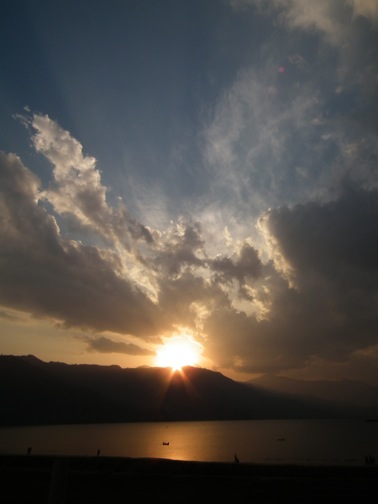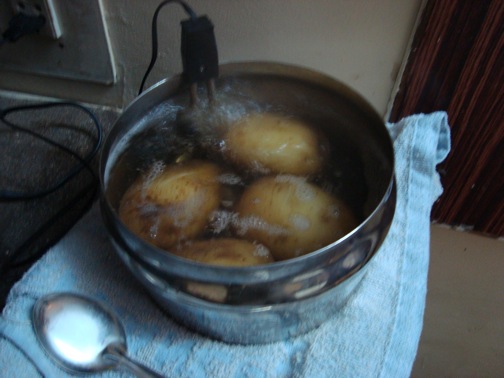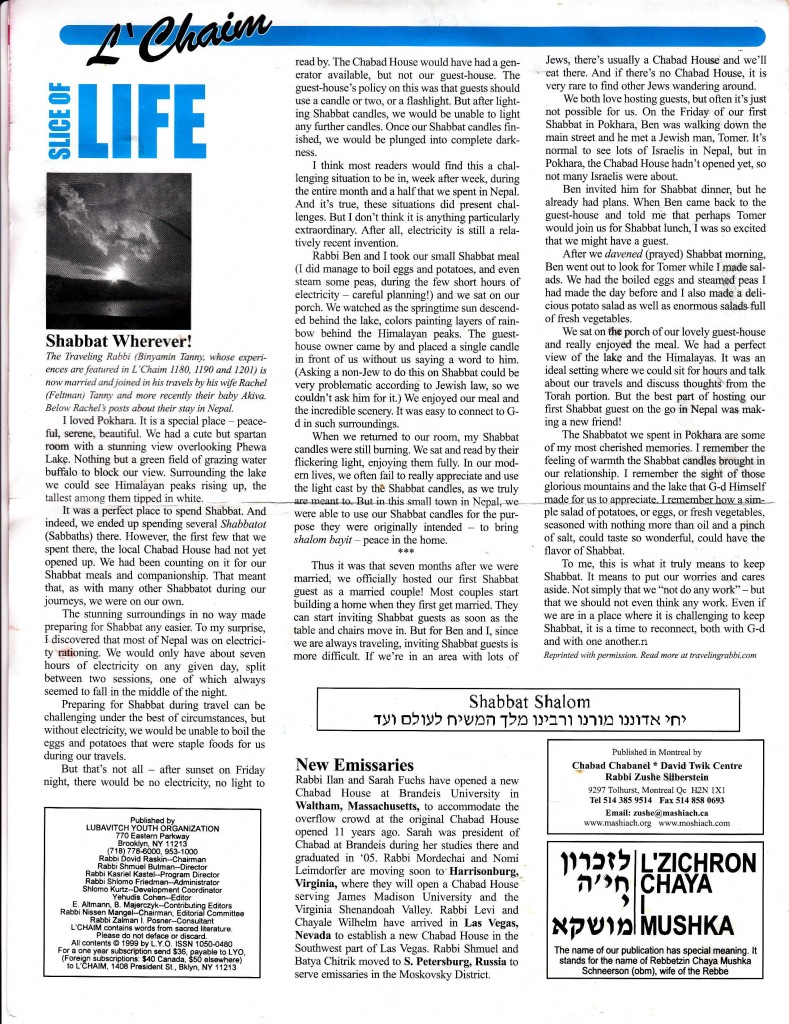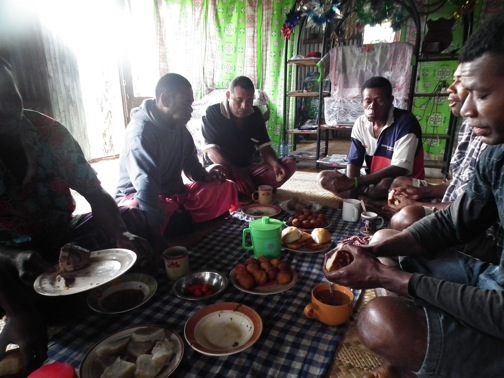
Sunset behind Phewa Lake in Pokhara, Nepal, taken from our guesthouse
I loved Pokhara. It was a special place to me – peaceful, serene, beautiful. We had a cute but spartan room with the most stunning view overlooking Phewa Lake. Nothing but a green field of grazing water buffalo was there to obstruct our view. Surrounding the lake we could see Himalayan peaks rising up, the tallest among them tipped in white.
It was a perfect place to spend Shabbos. And indeed, we ended up spending several Shabbosim there. However, the first couple we spent there, the local Chabad House had not yet opened up. We had been counting on it for our Shabbos meals and companionship. That meant that, as with numerous other Shabbosim during our journeys, we were on our own.
Yet, the stunning surroundings in no way made preparing for Shabbat any easier. To my surprise, I discovered that most of Nepal was on electricity rationing. According to the schedules, we would only have about 7 hours or so of electricity on any given day, split between two sessions, one of which always seemed to fall in the middle of the night. Preparing for Shabbat during travel can be challenging under the best of circumstances, but without electricity, we would be unable to boil the eggs and potatoes that were staple foods for us during our travels.
But that’s not all – after sunset on Friday night, there would be no electricity, no light to read by. The Chabad House would have had a generator available, but not our guesthouse. The guesthouse’s policy on this was just that guests should use a candle or two, or a flashlight (in our case, a headlamp). But after lighting Shabbos candles, we would be unable to light any further candles. Once our Shabbos candles finished, we would be plunged into complete darkness and we wouldn’t be able to wear our headlamps either.
I think most people out there would find this a challenging situation to be in, week after week, during the entire month and a half that we spent in Nepal. And it’s true, these situations did present challenges. But I don’t think of it as anything particularly extraordinary. After all, electricity is still a relatively recent invention. We just take our modern living for granted.
In this week’s parsha, when we receive the 10 commandments, one of the most important is to keep the Sabbath. The ancient Israelites did not have electricity as they spent 40 years traveling in the desert. They would not have had to cook their own food, that is true (the manna that fell took on any taste they wanted), but they would still have had to sit around the Shabbos table. They would have wanted light to see by during and after the meal and they wouldn’t have just been able to run to the store and pick up some extra candles. They would probably have used clay or stone lamps filled with oil with a wick burning in them, rather than candles. When the oil ran out, so did the light.
So Rabbi Ben and I took our small Shabbos meal (I did manage to boil some eggs and potatoes, and even steam some peas, during the few short hours of electricity – careful planning!) and we went to sit outside. We watched as the springtime sun descended behind the lake, colors painting layers of rainbow behind the Himalayan peaks. The guesthouse owner came by and gratuitously placed a single candle in front of us without us needing to ever say a word to him. (Asking a non-Jew to do this type of work on Shabbat could be very problematic, so we couldn’t ask him for it.) We enjoyed our meal and the incredible scenery. It was not hard to connect to Hashem in such surroundings.
When we returned to our room, my Shabbos candles were still burning. We sat and read by their flickering light, enjoying them fully. In our modern lives, we often fail to really appreciate and use the light cast by our Shabbos candles, as we truly are meant to. But in this small town in Nepal, we were able to use our Shabbos candles for the purpose they were originally intended – to bring shalom bayis (“peace in the home”).

Boiling potatoes for dinner requires a lot of patience, especially when there is not often electricity
These Shabbosim we spent together in Pokhara are some of my most cherished moments. I remember the feeling of warmth the Shabbos candles brought in our relationship. I remember the sight of those glorious mountains and the beautiful lake that Hashem Himself made for us to appreciate. I remember how a simple salad of potatoes, or eggs, or fresh vegetables, seasoned with nothing more than oil and a pinch of salt, could taste so wonderful, could have the flavor of Shabbos.
This is what it truly means to keep Shabbos. It means to put our worries and cares aside. Not simply that we “shall not do any work” – but that we should not even think any work – even if we are in a place where it is challenging to keep Shabbos. It is a time to reconnect, both with Hashem and with one another.
This week as we head into Shabbos, let us concentrate on this most important of commandments, on keeping it fully, on keeping it well, and – most of all – on really appreciating its beauty as a gift that Hashem has given especially to us.
Read More













